Related Research Articles
Sharon Butala is a Canadian writer and novelist.

Lorna Crozier, OC is a Canadian poet, author, and former chair of the Writing Department at the University of Victoria. She is the author of twenty-five books and was named an Officer of the Order of Canada in 2011 as one of Canada's pre-eminent poets and for her teaching. Crozier is credited as Lorna Uher on some of her earlier works.
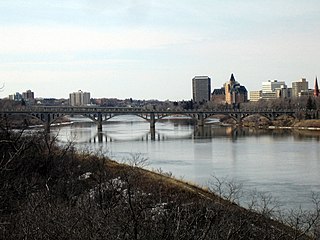
The South Saskatchewan River is a major river in the Canadian provinces of Alberta and Saskatchewan. The river begins at the confluence of the Bow and Oldman Rivers in southern Alberta and ends at the Saskatchewan River Forks in central Saskatchewan. The Saskatchewan River Forks is the confluence of the South and North Saskatchewan Rivers and is the beginning of the Saskatchewan River.
Linda Smith (1949–2007) was a Canadian writer.
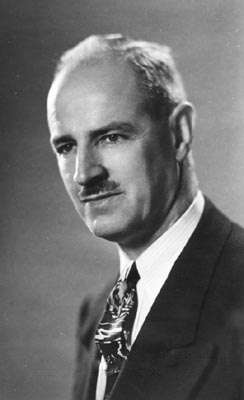
John Walter Grant MacEwan was a Canadian farmer, professor at the University of Saskatchewan, Dean of Agriculture at the University of Manitoba, the 28th Mayor of Calgary and both a Member of the Legislative Assembly (MLA) and the ninth Lieutenant Governor of Alberta, Canada. MacEwan University in Edmonton, Alberta, and the MacEwan Student Centre at the University of Calgary as well as the neighbourhoods of MacEwan Glen in Calgary and MacEwan in Edmonton are named after him.
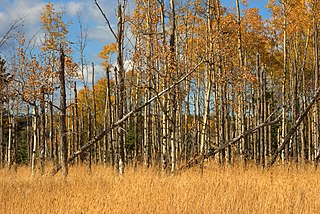
Aspen parkland refers to a very large area of transitional biome between prairie and boreal forest in two sections, namely the Peace River Country of northwestern Alberta crossing the border into British Columbia, and a much larger area stretching from central Alberta, all across central Saskatchewan to south central Manitoba and continuing into small parts of the US states of Minnesota and North Dakota. Aspen parkland consists of groves of aspen, poplar and spruce, interspersed with areas of prairie grasslands, also intersected by large stream and river valleys lined with aspen-spruce forests and dense shrubbery. This is the largest boreal-grassland transition zone in the world and is a zone of constant competition and tension as prairie and woodlands struggle to overtake each other within the parkland.
Anne Szumigalski, SOM was a Canadian poet.

Sarah Hall is a stained glass artist from Canada. Sarah Hall is internationally recognized for her large-scale art glass installations and solar projects. Her work can be found in churches, synagogues, schools, and other commercial and public buildings in Canada, the US, and Europe.

Jacqueline Jill Robinson is a Canadian writer and editor. She is the author of a novel and four collections of short stories. Her fiction and creative nonfiction have appeared in a wide variety of magazines and literary journals including Geist, the Antigonish Review, Event, Prairie Fire and the Windsor Review. Her novel, More In Anger, published in 2012, tells the stories of three generations of mothers and daughters who bear the emotional scars of loveless marriages, corrosive anger and misogyny.

The Western Women's Canadian Football League (WWCFL) is a full-contact women's Canadian football league which began play in the spring of 2011. The league plays an annual season in the spring and summer, and with seven teams it is the largest women's football league in Canada. The teams play 12-woman tackle football games using the Football Canada rules, similar to those of the Canadian Football League. The league has teams in Manitoba, Saskatchewan, and Alberta.
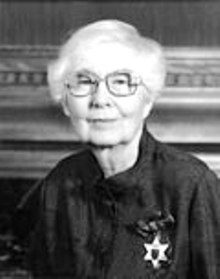
Reta Cowley was a Canadian painter. She is known for her watercolors of the prairie country around Saskatoon, Saskatchewan, which capture the unique qualities of space and light.
Rosemary Nixon is a Canadian author and novelist whose stories have appeared in Canadian literary magazines and in anthologies. She has published three collections of short stories and a novella in literary presses. She also teaches creative writing and is active as an editor.
Barbara Klar is a Canadian poet, who won the Gerald Lampert Award in 1994 for her poetry collection The Night You Called Me a Shadow.
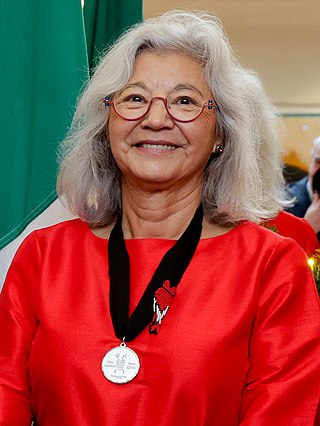
Louise Bernice Halfe, is a Cree poet and social worker from Canada. Halfe's Cree name is Sky Dancer. At the age of seven, she was forced to attend Blue Quills Residential School in St. Paul, Alberta. Halfe signed with Coteau Books in 1994 and has published four books of poetry: Bear Bones & Feathers (1994), Blue Marrow (1998/2005), The Crooked Good (2007) and Burning in this Midnight Dream (2016). Halfe uses code-switching, white space, and the stories of other Cree women in her poetry. Her experience at Blue Quills continues to influence her work today. Halfe's books have been well-received and have won multiple awards.
Ruth Cuthand D.F.A. is a Canadian artist of Plains Cree and Scots ancestry. She is considered an influential feminist artist of the Canadian prairies, and is lauded for her interpretation of racism and colonialism. Her work challenges mainstream perspectives on colonialism and the relationships between settlers and Indigenous people in a practice marked by political invective, humour, and a deliberate crudeness of style.

Cheryl L'Hirondelle is a Canadian multidisciplinary media artist, performer, and award-winning musician. She is of Métis/Cree (non-status/treaty), French, German, and Polish descent. Her work is tied to her cultural heritage. She explores a Cree worldview or nêhiyawin through body, mind, emotions, and spirit; examining what it means to live in contemporary space and time.
Honor Elizabeth Kever is a Canadian artist.
Jennifer Wynne Webber is a Canadian writer, actor, dramaturge, journalist, and television producer currently living and working on Vancouver Island, British Columbia.

A Geography of Blood: Unearthing Memory from a Prairie Landscape is a 2012 book by Canadian author Candace Savage. The book combines natural and human history to reconstruct the past of Southwest Saskatchewan, and in particular the settlement of the region by Canadians, which relied on the forceful removal of the region's Indigenous peoples. Savage explores the colonial history of the area, including the slaughter of the Plains bison, which was an integral part of Indigenous prairie life. The author was inspired initially by a stay in the town of Eastend at the childhood home of American author Wallace Stegner, who also wrote about the region in his autobiography Wolf Willow.

Dawn Dumont is the pen name of Dawn Marie Walker, a Plains Cree writer, former lawyer, comedian, former CEO and journalist from the Okanese First Nation in Saskatchewan, Canada.
References
- 1 2 3 4 "SAVAGE, CANDACE (1949-)". esask.uregina.ca. Retrieved December 5, 2019.
- ↑ "CANDACE SAVAGE". quillandquire.com. 16 September 2019. Retrieved December 5, 2019.
- 1 2 "SAVAGE, Candace (M.) 1949-". encyclopedia.com. Retrieved December 5, 2019.
- ↑ "Interview with Candace Savage Sheila Lavender". yfbta.com. Retrieved December 5, 2019.
- ↑ "Biography to come". Medicine Hat News. Alberta. October 8, 1977.

- ↑ "2002 Saskatchewan Book Awards Recipient: Candace Savage". bookcentre.ca. Retrieved December 5, 2019.
- ↑ "THE ROYAL SOCIETY OF CANADA (RSC) NEW FELLOWS 2010" (PDF). mcgill.ca. 2010. Archived from the original (PDF) on October 25, 2017. Retrieved December 5, 2019.
- ↑ Barber, John (November 12, 2012). "Candace Savage's A Geography of Blood wins $60,000 Hilary Weston prize". The Globe and Mail. Retrieved December 5, 2019.
- ↑ Carter, Sue (September 19, 2019). "Candace Savage plays detective about disgraceful era in Canadian history in new book". Toronto Star. Retrieved December 5, 2019.
- ↑ Deborah Dundas, "Writers’ Trust 2022 book award winners collect $270,000 in prizes". Toronto Star , November 2, 2022.